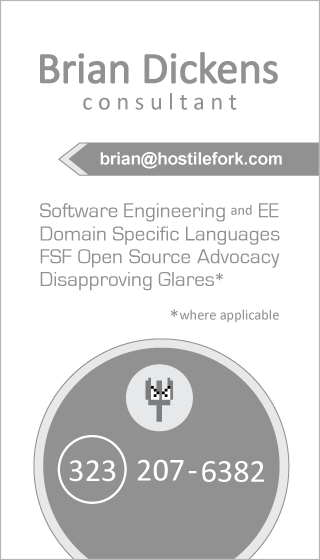Hello, and welcome! This is my "technology blog", which I kicked off in November 2007. Through a mixture of backdated articles from my hard drive and my semi-monthly ramblings, it has been slowly growing both forward and backwards in time...
If you're not familiar with the open source movement, you might not know what a "hostile fork" is. It's what happens when someone isn't happy about the way a collaborative effort is being run, so they start their own competing project taking the work of the group in a different direction, rather than working on achieving a consensus. Hostile Forks bother me, but at the same time I envisioned a cute mascot who would be a crusader against such things--more "irate" (with angry eyebrows) than actually "hostile".
That cartoon has turned out to be a pretty fitting match for my personality. As a rather serious C++ and Assembly engineer in the 90s, I was somewhat horrified by the strings-and-glue that held together Web 1.0. Yet though I left the field seething at the PHP and JavaScript codebases that were coming to power... I've recently found a contagiousness to the free culture and free software movements that's hard to resist. So I decided to swallow my pride and start looking at Web 2.0 with an open mind (and not too much screaming), to see what ideas I can throw in.
I don't intend to do too much "blogging" about my day to day life here. I want to keep the site focused on useful articles and downloads--so if you want to know what movies I like to watch or where I had lunch, let's do that over email (just stick gmail.com onto the site name, minus the dot com, and you should reach me). Linking to my pages and commenting on what I write is appreciated, and I won't betray your trust by littering the site with ads or anything like that.
I'm hoping to use the domain to host services of relevance to the open-source software movement. There is one project in particular that I'd like to work on (which is how the site got its name in the first place) and I'll try to roughly explain what it is, though it's just in the concept stage right now... so here goes:
Hostile Forks didn't happen all that frequently in the past. People didn't typically work together without some kind of arrangement establishing who owns the rights to work being done. So breaking off meant starting from scratch—a difficult proposition! It certainly happened, but people were likely to think twice before duplicating the effort.
In the digital era, the climate is changing—and software is making it possible to share powerful tools with each other. We can exchange documents without printing so much as a single sheet of paper. A lot more things can be given away for free (some cases legally, and others illegally). Though traditional businesses are trying to ramp up the litigation, a counterculture has sprung up that is literally handing out the products of untold hours of work without charge.
Possibly the most prominent efforts are the Free Software Foundation and the Wikimedia Foundation--which manages Wikipedia. Yet there are countless individuals striving toward these goals in one way or another—from tool developers to every blogger who makes their thoughts available on the web!!
These new attitudes are great, but aren't necessarily backed by the spirit of cooperation. While feverishly working to generate great free things to give the world, few are actually researching how their efforts might be surpassed by another option. And with so much priority placed on plowing ahead with innovation—there's generally just not the time to spend bringing people into the fold and figuring out how an optimal solution can be reached that integrates the best of everyone's efforts.
I believe almost everyone wants to bring about the world where people never have to waste their time on a redundant effort (unless they really want to). A lot of people running commercial projects—working in isolation—would rather have more people able to enjoy the products of their work, and participate in the creation. But they want respect, need money, and can't feasibly do it. Or could they if someone were actively looking to untangle the dependencies...proactively sticking their fork in the business of others??
That's a huge question, and many think that human nature and the essential complexity of the world's problems are too much of a blockade to make this ever happen. But I had the idea to start a mission to actually catalog divergent efforts, and orchestrate an intervention to properly moderate the personalities and needs of the people who are working in those projects.
The Free Software Foundation gets involved in this kind of moderation, but only when it's "important"--like the split between KDE and GNOME. Nobody is watching out for smaller cases, and I'd like to see the global community start outreaching--without even being asked--to see how they can help improve things. To do so requires databases for tracking the projects, setting up academic sandboxes where learning exercises aren't mistaken for production code, and building tools to help warn a hapless user when they're on an outmoded project.
Of course, it would be ironic if I'm going to do a crappy job of it while another group is taking on the same problems in a better way. Which is part of why I've been sitting back and watching how systems like Wikipedia have grown to give a community-built survey of many projects--it's amazing. But I do think I have some unique ideas that could contribute, and I'll try to express those more clearly as this project goes on. Please feel free to add your thoughts...

